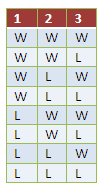Probability Terminologies and Notations
We had several discussions about probability and before we delve deeper on this topic, let us reinforce our knowledge by familiarizing ourselves with the terminologies and notations used. This is in preparation to more discussions ahead. Aside from probability, we will also learn more about permutations, combinations, statistics and other related fields. The following are the common terms used in probability as well as the notations used in most textbooks.
Terminologies
Outcome
If a coin is tossed, when the coin comes to rest, it can show a tail or a head, each of which is an outcome.
Trial
Each roll of a die or toss of a coin is a trial.
Experiment
An experiment consists of one or more trials. » Read more
